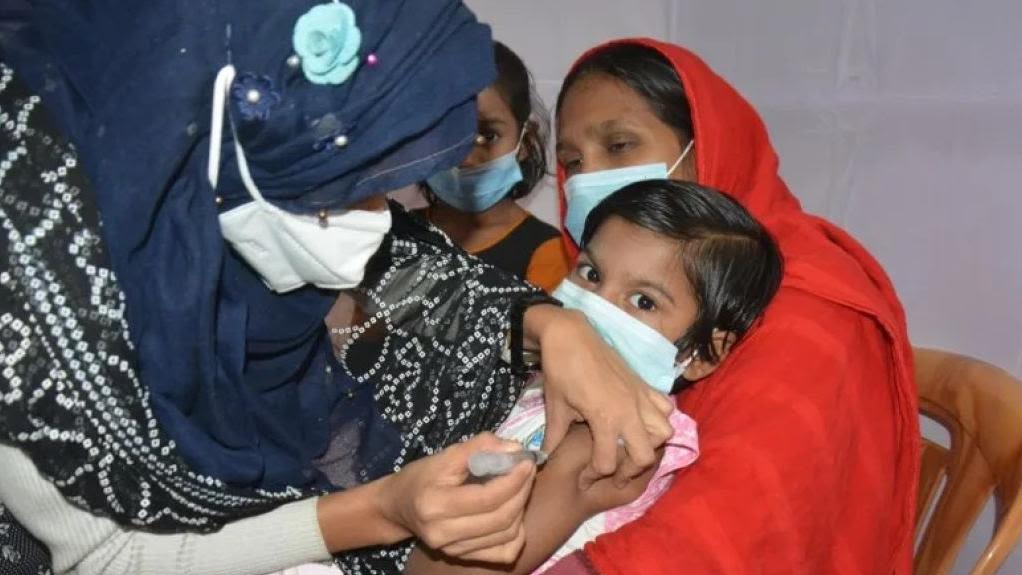

The TyVOID study, published in the Lancet, measured the effectiveness of a single dose TCV in Bangladeshi children over a five-year period and confirmed the high vaccine protection (80-96%) within two years of vaccination in all children.
Three to five years after vaccination, the study found a three-fold increase in typhoid incidence in children who received TCV in 2018/2019 and those who received it in 2021, suggesting a decline in vaccine effectiveness, most pronounced in the very young. The data suggested children vaccinated at two years or older were still well protected (59-85%) at 3-5 years post vaccination however, a more significant decline in protection was seen in children vaccinated at under two years of age, suggesting that a booster dose for these children might be needed for sustained protection.
Xinxue Liu, Associate Professor of Medical Statistics and Epidemiology at the Oxford Vaccine Group, and one of the senior authors of the study, said: ‘Typhoid is a serious and life-threatening enteric fever that remains a substantial public health issue for children and adolescents in low- and middle-income countries. TCV offers the best chance to reduce the burden of typhoid, helping to reduce transmission and limiting further evolution of drug-resistant strains. This study provides additional information for policy makers on longer-term TCV protection and the importance of continued investigation and updated guidance.’
Dr Firdausi Qadri, Senior Scientist at the Infectious Diseases Division at the International Centre for Diarrhoeal Disease Research, Bangladesh (icddr,b), and first author on the study, said: ‘This TyVOID study followed the original TyVAC cluster randomised controlled trial population for another two and a half years after unmasking in 2021. The results indicate a decay in antibody concentrations in different age groups and suggest that a booster dose around school entry age for children vaccinated while younger than 2 years could be considered, to sustain the protection from TCV through the school years when children are at greatest risk of typhoid.’
Read the full story on the University of Oxford website.
more recommended stories
 Pediatric Crohn’s Disease Microbial Signature Identified
Pediatric Crohn’s Disease Microbial Signature IdentifiedKey Points at a Glance NYU.
 Nanovaccine Design Boosts Immune Attack on HPV Tumors
Nanovaccine Design Boosts Immune Attack on HPV TumorsKey Highlights Reconfiguring peptide orientation significantly.
 High-Fat Diets Cause Damage to Metabolic Health
High-Fat Diets Cause Damage to Metabolic HealthKey Points Takeaways High-fat and ketogenic.
 Acute Ischemic Stroke: New Evidence for Neuroprotection
Acute Ischemic Stroke: New Evidence for NeuroprotectionKey Highlights A Phase III clinical.
 Statins Rarely Cause Side Effects, Large Trials Show
Statins Rarely Cause Side Effects, Large Trials ShowKey Points at a Glance Large.
 Anxiety Reduction and Emotional Support on Social Media
Anxiety Reduction and Emotional Support on Social MediaKey Summary Anxiety commonly begins in.
 Liquid Biopsy Measures Epigenetic Instability in Cancer
Liquid Biopsy Measures Epigenetic Instability in CancerKey Takeaways Johns Hopkins researchers developed.
 Human Antibody Drug Response Prediction Gets an Upgrade
Human Antibody Drug Response Prediction Gets an UpgradeKey Takeaways A new humanized antibody.
 Pancreatic Cancer Research: Triple-Drug Therapy Success
Pancreatic Cancer Research: Triple-Drug Therapy SuccessKey Summary Spanish researchers report complete.
 Immune Cell Epigenome Links Genetics and Life Experience
Immune Cell Epigenome Links Genetics and Life ExperienceKey Takeaway Summary Immune cell responses.

Leave a Comment